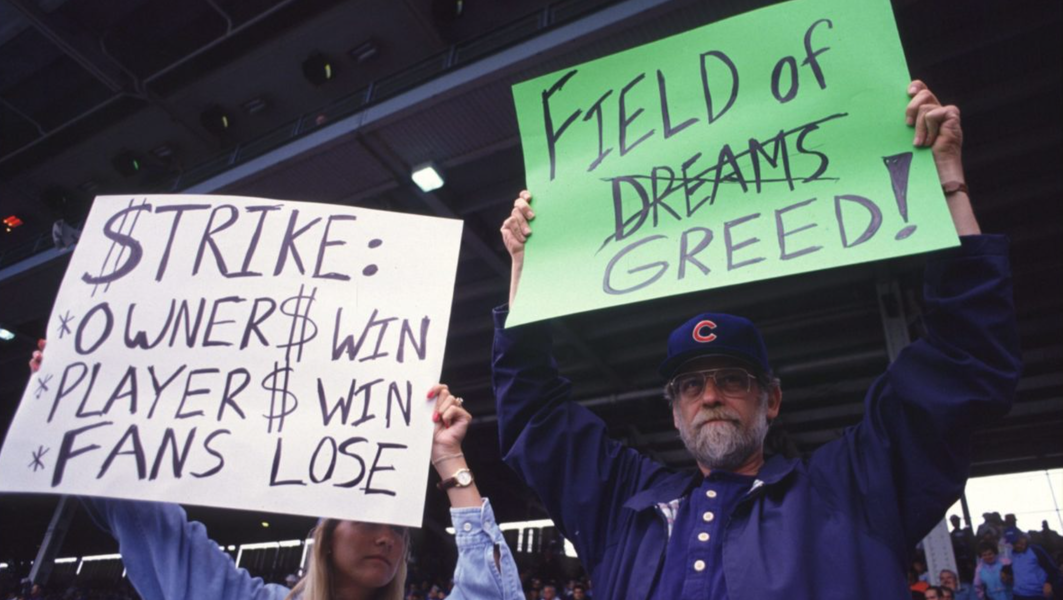 |
Players Union Announces Strike, Massachusetts Baseball League Season in Jeopardy
May 15, 1986 – Boston, MA – The Massachusetts Baseball League Players Association (MBLPA) announced today that players will go on strike, effective immediately, halting the 1986 Massachusetts Baseball League (MBL) season. The decision comes after months of contentious negotiations with team owners over salary disputes, free agency, and pension benefits, with the primary catalyst being the owners' decision to expand the season from 81 games to 100.
The announcement was made by MBLPA executive director Marvin Miller at a packed press conference held at the association’s headquarters in Boston. Flanked by several high-profile players, including Mike Schmidt, Dale Murphy, and Cal Ripken Jr., Miller detailed the reasons behind the strike.
Key Issues
Season Expansion: The main reason behind the strike is the owners' unilateral decision to expand the season from 81 games to 100. Players argue that the longer season increases the risk of injuries and puts additional strain on their bodies without corresponding compensation. “We’re already playing a physically demanding sport,” said Schmidt. “Adding more games without considering our well-being is unacceptable.”
Salary Disputes: Players are demanding higher salaries to reflect the increased revenue and workload. Despite a booming industry, they argue that they are not receiving a fair share of the profits. “The owners have been reaping the benefits of our hard work while refusing to fairly compensate us,” said Schmidt. “We’re standing up not just for ourselves, but for future generations of ballplayers.”
Free Agency: The players are seeking improvements to the free agency system, which they argue currently restricts their ability to negotiate fair market contracts. “Free agency is supposed to allow us to have some control over our careers,” said Murphy. “But the current system is broken and heavily favors the owners.”
Pension Benefits: Another sticking point is the issue of pension benefits. Players are demanding better retirement benefits and healthcare coverage. “We sacrifice our bodies and our health for this game,” said Ripken Jr. “It’s only fair that we have security after our playing days are over.”
Impact on the Season
The strike puts the 1986 MBL season in serious jeopardy. With no end in sight, games will be canceled, and fans are left wondering when they will see their favorite players back on the field. The strike is expected to have significant financial implications for the league, teams, and cities that rely on the revenue generated by baseball games.
Commissioner Peter Ueberroth expressed his disappointment in a statement released shortly after the strike was announced. “This is a sad day for baseball,” Ueberroth said. “We understand the players’ concerns, but we believe that the best place to resolve these issues is at the negotiating table, not by walking away from the game.”
Fan Reactions
Reactions from fans have been mixed. Some support the players' demands for fair treatment, while others are frustrated by the interruption of the season. “I get where they’re coming from, but it’s really disappointing not to have baseball,” said John Stevens, a lifelong Yankees fan. “I hope they can figure this out soon.”
Others have expressed solidarity with the players. “These guys put their health on the line every day,” said Linda Martinez, a Dodgers fan. “They deserve to be compensated fairly and have security for their futures.”
What’s Next?
Negotiations are expected to continue, but it is unclear how long the strike will last. Both sides remain entrenched in their positions, with little indication of an imminent resolution. In the meantime, the ballparks will remain empty, and the 1986 season hangs in the balance.
As the summer begins, the fate of America’s pastime is uncertain. The players have made their stand, and now the baseball world waits to see what comes next.
